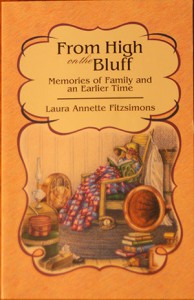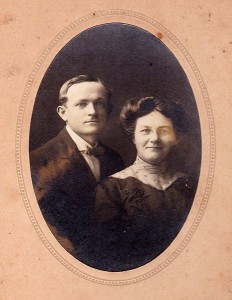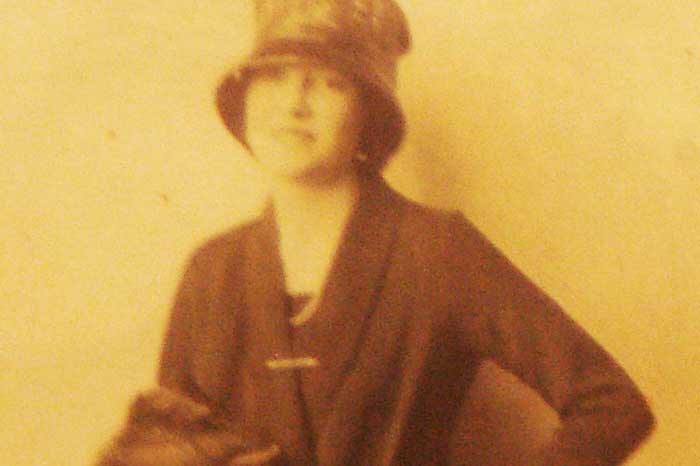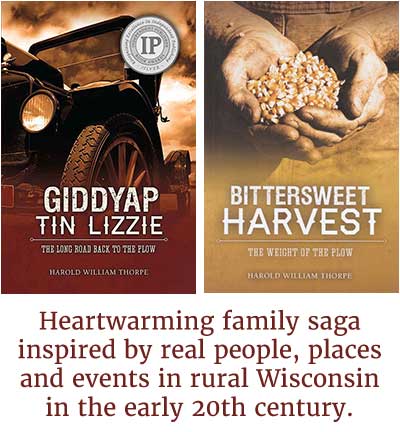Most would-be authors dream of acquiring riches, but who’d believe that a ninety-three-year-old woman’s memoir would bring income to dozens of people?
My mother, Laura Annette Fitzsimons-Thorpe, had written poetry throughout her life, but when I suggested she should write her memoir, she at first objected. I’d heard her family stories all of my life, and I thought she had interesting tales to tell. But most importantly, I wanted my children, my grandchildren, and the rest of our family members to have access to a first-hand account of their ancestors’ lives.
I prodded Mother to remember and tell her family stories, and I’d record them. I’d visit, and upon leaving, I’d suggest, “Write down all that you remember about Grandpa’s Mineral Point lightening rod business.” Given that cue she did as I’d asked.
Upon returning, I’d collect that information and leave with another suggestion: “Write all you remember about Cousin Gusta’s year with you on the farm.” Once she had the suggestions, she’d write pages of information.
 Sometimes I’d bring my tape recorder or video camera, ask numerous questions, and then record her answers. Over a year’s time, I’d collected enough information to write a book. From High on the Bluff: Memories of Family and an Earlier Time, by Laura Annette Fitzsimons, was published in 1999.
Sometimes I’d bring my tape recorder or video camera, ask numerous questions, and then record her answers. Over a year’s time, I’d collected enough information to write a book. From High on the Bluff: Memories of Family and an Earlier Time, by Laura Annette Fitzsimons, was published in 1999.
At the time, we couldn’t know how this simple family history would influence so many people. We expected that it would become a resource for relatives who were interested in their family. And it has—but it has influenced way beyond providing the family with information.
For me, her stories became the inspiration for my book series, The O’Shaughnessy Chronicles—actually, for my whole writing career. Without the experience of organizing her information and putting it into a book, I’d probably never have begun my own stories.
Our family had a mystery that hadn’t yet been solved when Mother wrote her book. Her incorrigible cousin, Gusta Stephens, came north from Texas to live with them for a year on their Wisconsin River valley farm. After Gusta returned to her Texas home, they continued to correspond, and she returned to Wisconsin several times to visit her relatives—then, with no forewarning, Gusta disappeared off the face of the earth. Mother would wistfully comment, “Whatever could have happened to Gusta?”
Because of Mother’s book, Gusta’s fate was revealed in 2012—but it came too late for Mother to learn the answer to her often-asked question. Mother died in 2010 at 103 years of age.
Gusta married an Argentinian, Louis des Rets. Mother knew they’d returned to his homeland. That’s when the correspondence stopped. The Hess Oil Company’s “land man,” Brent Schellin, discovered U.S. state department records that told Gusta’s fate. She was returning to the U.S. on an Argentinian ship, the Campana, when on December 28, 1943 she disappeared. Did she jump? Was she pushed? They assumed that she jumped. But there was no eyewitness.

Gusta and her Argentinean husband, Louis des Rets.
Juan Peron led a populist coup against Argentine’s elite civilian government at the time Gusta disappeared. Peron was a Nazi sympathizer, and Gusta was just an American citizen. Or was she? Did something more sinister play a role in her disappearance?—a disappearance that was noted by the State Department. We’ll never know the answer, but maybe it was a good thing that Mother never learned, “Whatever could have happened to Gusta?”
A year after Mother’s death, I read about the North Dakota oil boom. Remembering that my great-great-grandfather, Joseph Stephens, had homesteaded in North Dakota’s Williston Basin during the late 1800s, I began a long process to determine if our family had any rights to oil property. We did! This search eventually turned into a lease with a large oil company, followed by drilling and revenues.
Discovering and locating Joseph’s heirs was a necessary part of the process. Mother had traced her family in her book. I sent it to the oil company’s “land man,” and he used it to locate more than eighty percent of the rightful heirs—many who’d never have been found if Mother hadn’t written her memoir.
One never knows what writing your family story will produce. It’s like throwing a bottle with a message into the ocean. Maybe someone will be thrilled, perhaps even benefit, if they find it.
Learn even more about Gusta’s story in her Real Life Characters profile: Gusta Stephens.









